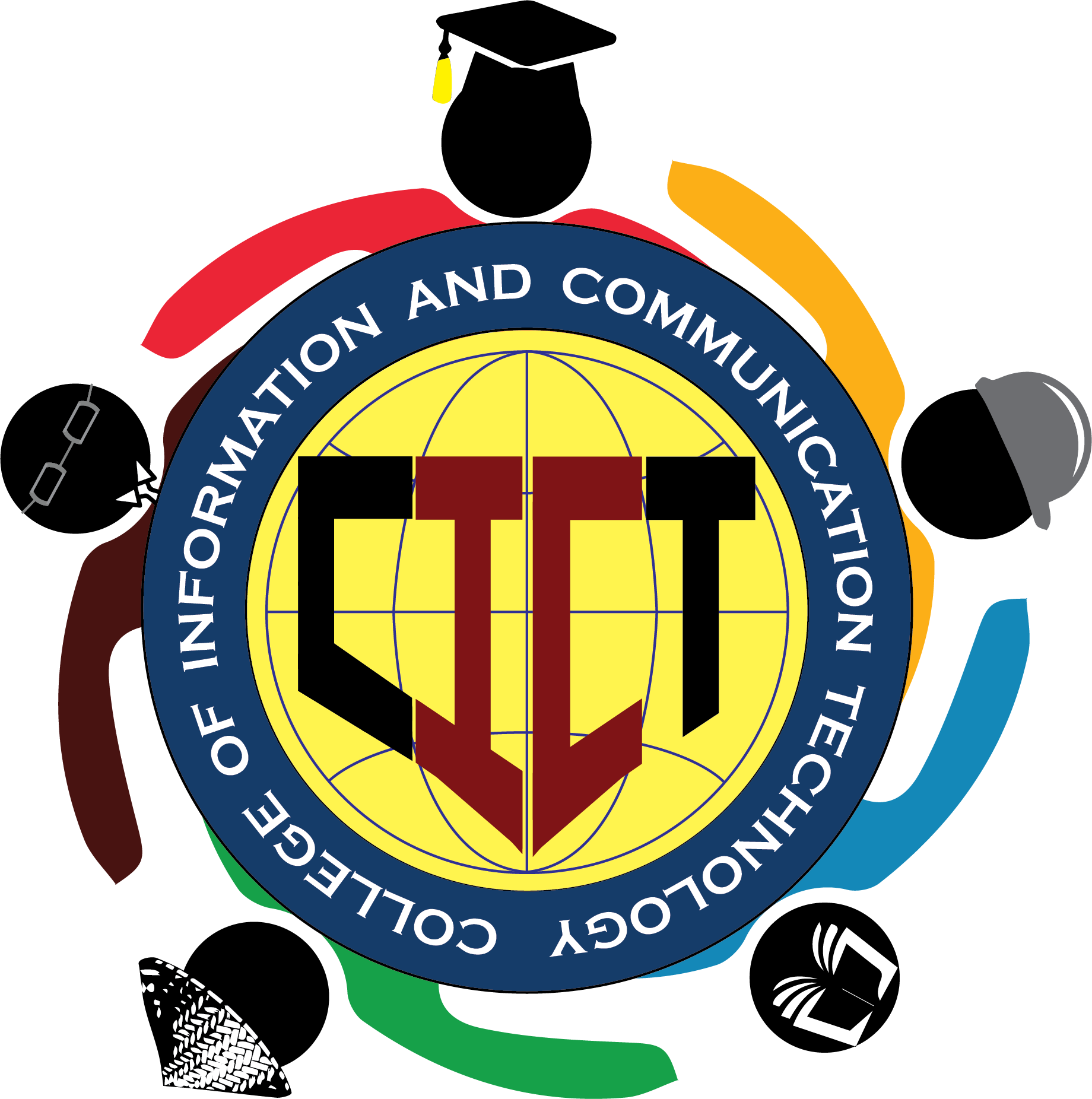
COLLEGE OF INFORMATION AND COMMUNICATION TECHNOLOGY CURRICULAR PROGRAM
Goals:
To develop technology that will support critical operations in industries, in any computing platform that emphasizes software development and artificial intelligence.
Objectives:
- Produce competent Information Technology professionals equipped with relevant, theoretical, and applied technology skills to meet the demands of the global industry;
- Develop ethical and moral values for holistic development; and
- Strengthen relevant research and extension programs for the development of Information Technology industry adaptive to local and international milieu.
Bachelor of Science in Information Technology (BSIT) Download Prospectus
The Information Technology program aims to prepare students to utilize both hardware and software technologies involving planning, installing, customizing, operating, managing and administering, and maintaining information technology infrastructure that provides computing solutions to address the needs of an organization. It also prepares graduates to address various user needs involving selection, development, application, integration and management of computing technologies within an organization.
Program Outcomes:
- Apply concepts in computing fundamentals, computing specialization, algorithms, science and mathematics or domain knowledge to the abstraction and conceptualization of computing models from defined problems and requirements.
- Understand best practices and standards and their applications.
- Identify and accommodate user needs in the design, selection, creation, and administration of technology solutions, including interface, access and usability aspects.
- Analyze complex computing problems and apply principles and methodologies of computing and other relevant disciplines to identify solutions
- Design, implement, and evaluate computer-based systems, processes, components, or programs to meet desired needs and requirements under various constraints
- Demonstrate an understanding of the best practices and standards and their application in order to identify and evaluate current and emerging technologies and assess their applicability to address the user’s needs.
- Integrate it-based solutions into the user environment effectively
- Apply knowledge through the use of current techniques, skills, tools and practices necessary for the IT profession.
- Function effectively as a member or leader in diverse teams, or multidisciplinary settings, recognizing the different roles, backgrounds, within a team to accomplish a common goal
- Assist in the creation of an effective it project plans
- Communicate effectively with the computing community and with society at large about complex computing activities through logical writing, presentations, and clear instructions
- Interact with and understand diverse groups using a strong IT vocabulary.
- Analyze the local and global impact of computing information technology on individuals, organizations, and society.
- Understand and actively practice professional ethics in the development and responsible use of information technology.
- Identify appropriate IT methods used in protecting confidentiality, integrity, and availability of information.
- Recognize the need for continuing professional development in either the formal education sector and/or in active participation in professional societies and in corporate social responsibility goals and activities.
Bachelor of Science in Information System (BSIS) Download Prospectus
The Information Systems program aims to prepare students to implement an information system, which considers complex technological and organizational factors affecting an organization. These include components, tools, techniques, strategies, methodologies, etc. Help an organization determine how information and technology-enabled business processes can be used as a strategic tool to achieve a competitive advantage.
Program Outcomes:
- Apply knowledge of business processes, computing, mathematics, and social sciences appropriate to Information Systems.
- Understand best practices and standards and their applications.
- Analyze a problem, identify and define the computing requirements with respect to organizational factors appropriate to its solution and plan strategies for their solution.
- Identify and accommodate user needs in the design, selection, creation, and administration of technology solutions, including interface, access and usability aspects.
- Evaluate information systems in terms of general quality attributes and possible trade-offs presented within the given requirement.
- Design, implement and evaluate information systems, processes, components or programs and to source cost-benefit efficient alternatives to meet desired needs, goals, and constraints.
- Use knowledge and understanding of enterprises in the modeling and design of information systems.
- Deploy and use effectively skills, tools, and techniques necessary for information systems practice.
- Function effectively on teams(recognizing the different roles within a team and different ways of organizing teams) to accomplish a common goal.
- Communicate effectively with a range of audiences. Communication skills including technical writing, presentation and negotiation, and numeracy.
- Recognize the legal, social, ethical and professional issues involved in the exploitation of computer technology and be guided by the adoption of appropriate professional, ethical and legal practices both in the local and global community.
- Recognize the need for and engage in an independent and life-long learning, planning, self-learning and improving performance as the foundation for on-going professional development.
Bachelor of Science in Communication Technology (BSCT) Download Prospectus
BS Communication Technology is the systematic planning, implementing, monitoring, and revision of all the channels of communication within an organization, and between organizations; it also includes the organization and dissemination of new communication directives connected with an organization, network, or communications technology.
Aspects of communications management include developing corporate communication strategies, designing internal and external communications directives, and managing the flow of information, including online communication.
Bachelor of Science in Animation and Multimedia Arts (BSAM) Download Prospectus
Bachelor of Science in Animation and Multimedia Arts (BSAM) aims to prepare students to demonstrate knowledge and understanding of multimedia theories, genres and approaches in the applications of multimedia and animation; demonstrate technical proficiency in the use of appropriate hardware and software in the production of multimedia and animation systems; exhibit creativity and innovative thinking in the design of multimedia and animation projects; and, engage professionally and ethically in the practice of the profession and other community contexts.
Graduates of Animation and Multimedia Arts bring ideas to life from all kinds of industries -- beyond just entertainment and media. Along with others, they put their skills and imaginations to work everywhere from film, TV, games to medicines, education and even law. They are able to design and develop visual media. Design and create new media projects spanning print, web, games, animation and films. Develop concepts, create characters, special effects, design background and scriptwriting. Design games and model characters or objects.
Multimedia Artist and Animator , Multimedia producer, Graphic Artist, Web designer, Web developer, Digital imaging specialist, Multimedia scriptwriter, Interactive designer, 2D / 3D Modeler, 2D / 3D Animator, Background Artist, Character Animator, Clean – up artist, Digital ink and paint artist, Image Editor, Key frame animator, Video Game Designer, Motion Graphic Technician, Storyboard artists, Film and Video Editors, Special effects animator.


 Brgy. Labuyo, Tangub City, Misamis Occidental
Brgy. Labuyo, Tangub City, Misamis Occidental
 info@nmsc.edu.ph
info@nmsc.edu.ph
